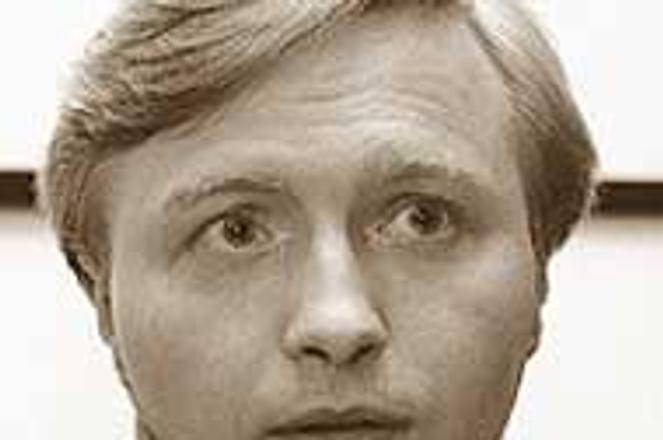The former President's son is heading to India as a consular officer.photo: TASR
The lengthy Michal Kováč Jr. saga may finally have reached its denouement. After being violently kidnapped in 1996 and smuggled across the border to Austria where he was dumped in front of a local police station, compensation for the act has come in the form of a diplomatic posting for the former Slovak president's son.
On May 11 Foreign Affairs Minister Eduard Kukan appointed Kováč Jr. to the position of third secretary at the Slovak Embassy in India, where he will work as a consular officer. Although no official date has yet been set, Kováč Jr. is expected to assume his position sometime in the autumn.
The decision brought criticism from the opposition Movement for a Democratic Slovakia (HZDS) and the Slovak National Party (SNS), both of whom said the appointment was another non-transparent act by the ruling government and the Foreign Ministry.
"This posting is another sign of the unprofessional and politically motivated decisions made by Kukan, which shows that he has a personal agenda at the ministry," said Zdenka Kramplová, HZDS Foreign Policy Vice-Chair and the Foreign Affairs Minister under the latest Vladimír Mečiar-led government from 1994 to 1998, in an official statement on May 25.
Peter Šulovský, the SNS's foreign policy expert, added: "Kováč Jr.'s appointment has seriously damaged Slovakia's image abroad." The move, he said, furthered the biased nature of Kukan's decisions which first began after the 1998 elections when the newly appointed Foreign Affairs Minister submitted suggestions to Prime Minister Mikuláš Dzurinda for the recall of most HZDS-appointed diplomats.
Kováč Jr., critics say, damages the image of Slovakia abroad because of his shady past which began in 1994 when German authorities issued a warrant for his arrest in connection to his alleged stripping of some two million Slovak crowns from the Technopol firm. The charges were dropped this year.
Ministry officials, however, said they saw no harm in the appointment. "Michal Kováč Jr. will be stationed at an office window and stamping passports for Indians visiting Slovakia," said Minister Kukan for the Národná Obroda daily on June 1. "The international charges against him have been dropped, which means that Kováč Jr. must be considered an innocent person," he said, adding that the "appointment is a kind of moral compensation" for the 1995 kidnapping.
Political analysts, meanwhile, said that Kováč Jr.'s new posting should not be viewed with envy, as it was far from a sinecure. "He'll be working in the second most populated country in the world, where he'll be handling such issues as returning dead bodies to their homeland, handling lost passports and so on," said Pavol Lukáč, a political analyst with the Bratislava-based Slovak Foreign Policy Association. "There's really nothing to be jealous about."
Lukáč added that statements made by the SNS and HZDS that Kováč's appointment would damage the national image were groundless. "It's not a high ranking political position and it in no way endangers Slovakia's reputation," he said. "Perhaps it would be a problem if he had been sent to the US or a European country where they know about him, but it won't be a problem with India."
Wild ride
The stormy and controversial history of Kováč Jr. began in November 1994 when German police issued an international warrant for his arrest concerning the Technopol affair. On August 31, 1995 he was again in the headlines when he was abducted from the car he was driving outside the town of Sväty Jur. He was beaten, forced to drink two bottles of hard alcohol, and smuggled across the border to Austria where he was dumped on the steps of a local police department.
Investigations into the kidnapping have suggested that the Slovak secret service was behind the act as part of a discreditation campaign against then-President Michal Kováč. One of the country's founding fathers and a former ally of Prime Minister Vladimír Mečiar, Kováč turned against the strong-armed politician by warning that Mečiar was leading Slovakia away from democratic principles and western bodies such as NATO and the European Union.
On September 8, 1995 police investigator Jaroslav Šimunič confirmed the involvement of the SIS in the kidnapping. He was then immediately dismissed from the case, as was a successor who came to the same conclusion. The Kováč Jr. investigation was tabled in 1997 for lack of evidence.
After spending four months in an Austrian prison, Kováč Jr. urged Slovakia to ask the Austrians for his release on January 3, 1996. The Mečiar-led Slovak government ignored his pleas. The next month, however, he was freed when the courts ruled that his human rights had been violated, and he returned to Slovakia.
On November 27, 1996 Kováč Jr. sued the state-run Slovak Television (STV) for airing false information about him. He later won two separate court battles against STV. The next year, his father granted amnesties to all people involved in the Technopol case, including Kováč Jr.
Saying that he was heading to Germany to answer the charges levied against him for the Technopol case, Kováč Jr. was arrested en route by Czech police on February 4, 1997 and handed over to the Germans. One month later, he was freed from custody after posting bail of 150,000 German marks.
After the Mečiar government was defeated in the 1998 national elections, the Slovak Foreign Affairs Ministry issued an official statement of apology for failing to provide assistance during Kováč Jr.'s imprisonment in Austria. The Technopol case was finally concluded on February 23, 2000 when the charges of fraud were dropped for insufficient evidence.


